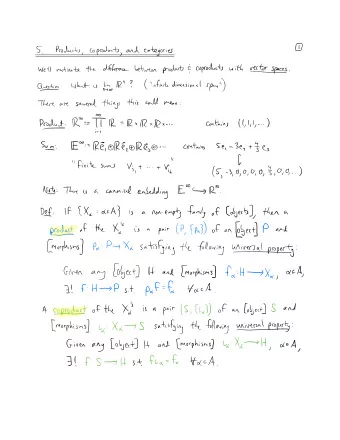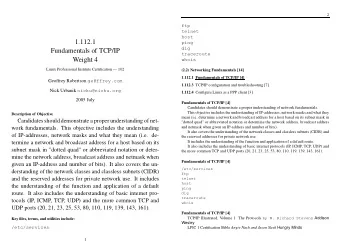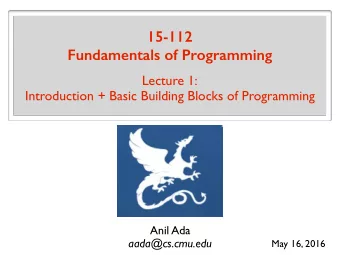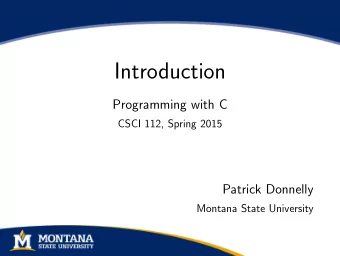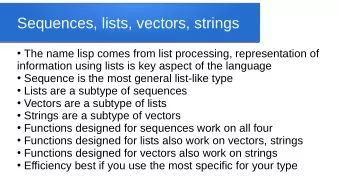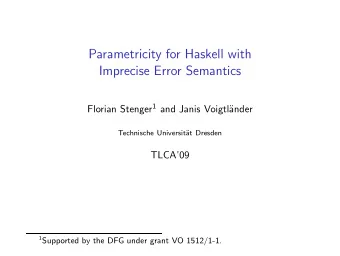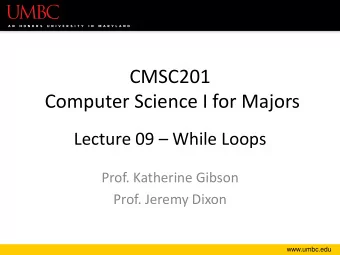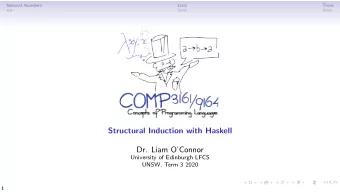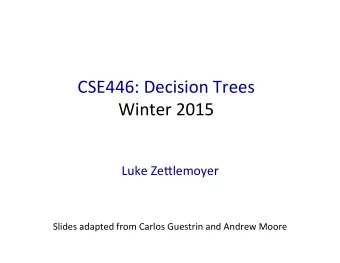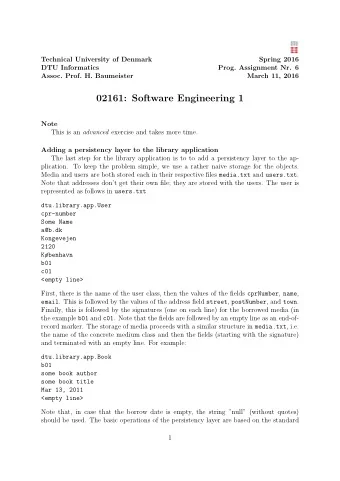
15-112 Fundamentals of Programming Week 2 - Lecture 3: Lists May - PowerPoint PPT Presentation
15-112 Fundamentals of Programming Week 2 - Lecture 3: Lists May 25, 2016 Builtin Data Types Python name Description Values NoneType absence of value None bool (boolean) Boolean values True, False int (integer) integer values to 2 63
15-112 Fundamentals of Programming Week 2 - Lecture 3: Lists May 25, 2016
Builtin Data Types Python name Description Values NoneType absence of value None bool (boolean) Boolean values True, False int (integer) integer values to 2 63 − 1 − 2 63 long large integer values all integers float fractional values e.g. 3.14 complex complex values e.g. 1+5j str (string) text e.g. “Hello World!” list a list of values e.g. [2, “hi”, 3.14] ...
String vs List string list s = “hw2-1 was hard” a = [1, 3.14, “hi”, True] A sequence (string) A sequence of of characters. arbitrary objects. immutable mutable s[0] = “H” a[0] = 100
Lists: basic usage a = [] # creates an empty list b = list() # also creates an empty list c = [1, 2, 3, 4, 5, 6, 7, 8, 9, 10] d = list(range(1, 11)) d = [1, 2, 3, 4, 5, 6, 7, 8, 9, 10] e = [1, 3.14, None, True, “Hi”, [1, 2, 3]] for i in range(len(c)): print(c[i]) for item in e: print(item) print(e[1:4]) e[2] = 0 print(e[::2])
Lists: basic usage print([1, 2, 3] + [4, 5, 6]) [1, 2, 3, 4, 5, 6] a = [0] * 5 print(a) [0, 0, 0, 0, 0] if (1 in a): print(“1 is in the list a.”) if (1 not in a): print(“1 is not in the list a.”) b = [0, 0, 0, 0, 0] if (a == b): print(“a and b contain the same elements.”)
Lists: built-in functions a = list(range(1, 11)) print(len(a)) print(min(a)) print(max(a)) print(sum(a)) a = [4, 5, 1, 3, 2, 8, 7, 6, 9, 10] a = sorted(a) print(a) [1, 2, 3, 4, 5, 6, 7, 8, 9, 10]
Lists: interesting example x = 1 y = x x += 1 print(x, y) 2 1 x = [1, 2, 3] y = x x[0] = 4 print(x, y) [4, 2, 3] [4, 2, 3]
immutable vs mutable Memory (Storage) Closer look at RAM (Main memory) memory cell ... 2843 2844 2845 Address 2846 2847 2848 2849 2850 ...
immutable vs mutable Immutable objects ... 2843 x = 5 2844 y = 4 2845 x 5 x = 1 2846 2847 y 4 y -= 2 2848 2849 2850 ...
immutable vs mutable Immutable objects ... 2843 x 1 x = 5 2844 y = 4 2845 5 x = 1 2846 2847 y 4 y -= 2 2848 2849 2850 ...
immutable vs mutable Immutable objects ... 2843 x 1 x = 5 2844 y = 4 2845 5 x = 1 2846 2847 4 y -= 2 2848 2849 2850 y 2 ...
immutable vs mutable Immutable objects ... 2843 x 1 x = 5 2844 y = 4 2845 5 x = 1 2846 Garbage 2847 4 y -= 2 2848 2849 2850 y 2 ...
immutable vs mutable Immutable objects ... 2843 x 1 x = 5 2844 y = 4 2845 x = 1 2846 “Garbage is collected” 2847 y -= 2 2848 2849 2850 y 2 ...
immutable vs mutable Immutable objects x 5 x = 5 y = 4 y 4
immutable vs mutable Immutable objects x 5 x = 5 y = 4 x = 1 y 4
immutable vs mutable Immutable objects x 5 x = 5 1 y = 4 x = 1 y 4
immutable vs mutable Immutable objects x 5 x = 5 1 y = 4 x = 1 y 4 y -= 2
immutable vs mutable Immutable objects x 5 x = 5 1 y = 4 x = 1 y 4 y -= 2 2
immutable vs mutable Immutable objects x 5 x = 5
immutable vs mutable Immutable objects x 5 x = 5 y = x y
immutable vs mutable Immutable objects x 5 x = 5 y = x y x += 1 print(x, y)
immutable vs mutable Immutable objects x 5 x = 5 6 y = x y x += 1 print(x, y) 6 5
immutable vs mutable Immutable objects x In reality: 5 x = 5 y y = x x 5 In practice: y 5 (seems like a good thing)
immutable vs mutable Mutable objects x x[0] x[1] x[2] x = [1, 2, 3] 1 2 3 So actually , a list is a sequence of references (variables)!
immutable vs mutable Mutable objects x x = [1, 2, 3] y y = x 1 2 3
immutable vs mutable Mutable objects x x = [1, 2, 3] y y = x 4 1 2 3 x[0] = 4
immutable vs mutable Mutable objects x x = [1, 2, 3] y y = x 4 1 2 3 x[0] = 4 print(y[0]) 4 x and y are aliases .
immutable vs mutable Mutable objects x x = [1, 2, 3] y = [1, 2, 3] 1 2 3 y True print(x == y) False print(x is y) True print(x[0] is y[0])
immutable vs mutable With simpler data types, immutabality is useful. (no side effects) With complex data types, mutability and aliasing is useful. (avoid copying large data) Suppose you have a list of names. You add another name to the list copy the whole list.
immutable vs mutable If lists were immutable: a million x = [“Alice”, “Bob”, “Charlie”, “David”, .......] names ....... x ....... “Alice” “Bob” “Charlie” “David”
immutable vs mutable If lists were immutable: a million x = [“Alice”, “Bob”, “Charlie”, “David”, .......] names x += [“Jordan”] ....... x ....... “Jordan” “Alice” “Bob” “Charlie” “David” .......
immutable vs mutable But lists are mutable a million x = [“Alice”, “Bob”, “Charlie”, “David”, .......] names x += [“Jordan”] ....... x ....... “Jordan” “Alice” “Bob” “Charlie” “David”
immutable vs mutable def square(a): def square(x): for i in range(len(a)): x = x**2 a[i] = a[i]**2 return x return a # Unnecessary n = 5 b = [1, 2, 3] squaredNum = square(n) squaredList = square(b) print(n, squaredNum) print(b, squaredList) 5 25 [1, 4, 9] [1, 4, 9] Original b is destroyed
immutable vs mutable import copy def square(x): def square(a): x = x**2 a = copy.copy(a) return x for i in range(len(a)): a[i] = a[i]**2 return a n = 5 squaredNum = square(n) b = [1, 2, 3] print(n, squaredNum) squaredList = square(b) 5 25 print(b, squaredList) [1, 2, 3] [1, 4, 9] Original b is not destroyed
immutable vs mutable Strings vs Lists names = “Alice,Bob,Charlie,…” a million names Suppose you want to change Bob to William: names = names.replace(“Bob”, “William”) Creates a new string with a million names.
immutable vs mutable Strings vs Lists a million names = [“Alice”, “Bob”, .......] names changeName(names, “Bob”, “William”) def changeName(a, oldName, newName): for index in range(len(a)): if (a[index] == oldName): a[index] = newName names and a are aliases. changes to a affect names. The list of names is never duplicated/recreated.
immutable vs mutable Strings vs Lists Immutable ----> make copy every time you change it. If dealing with huge strings, or need to modify a string many times: convert the string to a list first: longText = list(“Once upon a time, in a land far far away...”) converting the list back to a string: longTextString = “” .join(longText)
Digression: Alan Turing (1912-1954) British mathematician, logician, cryptanalyst, computer scientist. Father of computer science and artificial intelligence.
List operators and methods 2 types: Destructive - modifies original list Non-destructive - does not modify original list - creates a new list (with strings, for example, this is what happens)
List operators and methods Adding elements Destructive NonDestructive a = [1, 2, 3] a = [1, 2, 3] a.append(4) b = a + [4] a = [1, 2, 3, 4] b = [1, 2, 3, 4] a = [1, 2, 3] a.extend([5, 6]) c = b + [5, 6] a = [1, 2, 3, 4, 5, 6] c = [1, 2, 3, 4, 5, 6] b = [1, 2, 3, 4] a += [7, 8] # same as extend a = [1, 2, 3, 4, 5, 6, 7, 8] a.insert(1, 1.5) d = c[:1] + [1.5] + c[1:] a = [1, 1.5, 2, 3, 4, 5, 6, 7, 8] d = [1, 1.5, 2, 3, 4, 5, 6]
IMPORTANT! a = [1, 2, 3] a = [1, 2, 3] b = a b = a a += [4] a = a + [4] print(a) [1, 2, 3, 4] print(a) [1, 2, 3, 4] print(b) [1, 2, 3, 4] print(b) [1, 2, 3] a += [4] not same as a = a + [4]
List operators and methods Removing elements Destructive NonDestructive a = [1, 2, 3, 1, 2, 3, 1, 2, 3] a.remove(3) a = [1, 2, 1, 2, 3, 1, 2, 3] a.remove(3) a = [1, 2, 1, 2, 1, 2, 3] a.pop() a = [1, 2, 1, 2, 1, 2] print(a.pop(0)) 1 a = [2, 1, 2, 1, 2] a = [2, 1, 2, 1, 2] a[1:3] = [ ] b = a[:1] + a[3:] a = [2, 1, 2] b = [2, 1, 2] a = [2, 1, 2, 1, 2] del a[1:] a = [2]
List operators and methods Common Mistakes def remove(someList, element): Index range changes for index in range(len(someList)): every time you pop. if (someList[index] == element): someList.pop(index) def total(someList): t = 0 Never change the list while (someList != []): if you don’t need to! t += someList.pop() return t a = [1, 2, 3, 1, 2, 3, 1, 2, 3] print(total(a)) print(a) []
List operators and methods sort vs sorted Destructive NonDestructive a = [1, 2, 3, 1, 2, 3] a = [1, 2, 3, 1, 2, 3] a.sort() b = sorted(a) a = [1, 1, 2, 2, 3, 3] b = [1, 1, 2, 2, 3, 3] a = [1, 2, 3, 1, 2, 3]
List operators and methods finding an element a = [1, 2, 3, 1, 2, 3] print(a.index(2)) 1 ERROR: no method called ‘find’ print(a.find(2)) ERROR: 4 is not in the list print(a.index(4)) if (4 in a): print(“4 is at index”, a.index(4)) else : print(“4 is not in the list.”)
List operators and methods others https://docs.python.org/3/library/stdtypes.html#typesseq-mutable https://docs.python.org/3/tutorial/datastructures.html#more-on-lists
Summary Destructive NonDestructive (modifies the given list) += +, * every method that functions manipulates the list del statement slicing Be careful about aliasing (especially with function parameters)
Tuples The immutable brother of lists
Recommend
More recommend
Explore More Topics
Stay informed with curated content and fresh updates.
